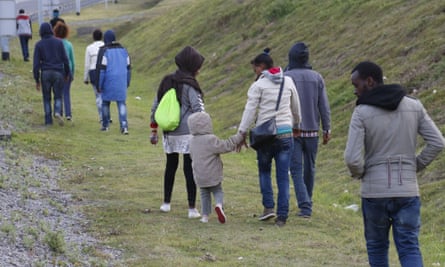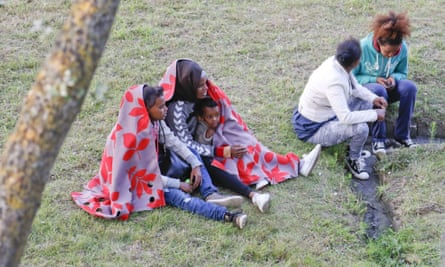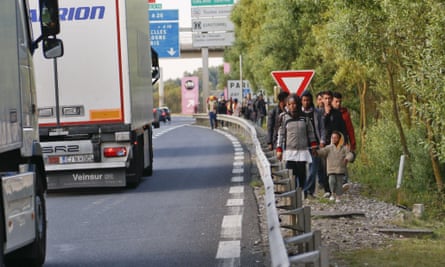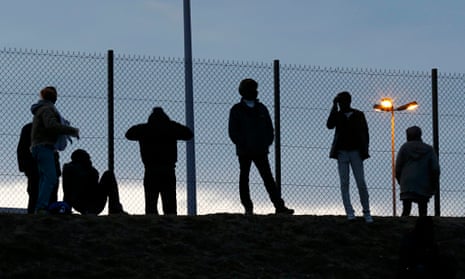I looked at Salah Mohammed Ali and wondered how he would be remembered if he died trying to reach the shores of England tonight. It was not a fanciful speculation.
Since 1 June, 10 refugees have died on the roads around Calais, at the port or inside the Channel tunnel. Their number included an Eritrean woman hit by a car last week on Calais’s urban motorway. A few days before, a Sudanese man had tried to jump on to the Eurostar. He misjudged the distance and the train smashed his head open. Worst of all was Samir, an Eritrean baby, who lived and died within the space of an hour. Her young mother fell from a truck heading to Dover. The fall triggered a premature birth and that was Samir’s life over before it had begun.
It is a scant consolation, but at least Samir’s name is remembered. Even the many good French men and women and African volunteers, who are trying to bring basic services to the Calais camp, do not know who most of the dead are. They are nameless people, whose crushed and suffocated bodies are left in unvisited graves.
Despite all the risks, Salah is determined to reach Britain. He has escaped from Darfur, scene of a genocide the “international community” did nothing to stop, and is not going to abandon his dream of a new life when he can see England from the water’s edge. He’s broad and strong and will make it across or die in the attempt.
The best he could once have hoped for from the bellicose British if he fell at the last barrier was to be remembered as the cause of traffic jams that held up the flow of consumer goods to superstores. Or perhaps as a reason for holiday-makers to vent their righteous anger, if he delayed their “well-earned breaks” by selfishly dying on a tourist route, and at the start of the school holidays at that.
Now we learn that migrants do not just menace the weekly shop and annual holiday. They are “swarming” towards us, as if they are a host of mosquitos that must be drenched with pesticide, or a plague of locusts destroying everything in its path. The inhuman comparison is not from some newspaper columnist, who is paid to pull faces to order like a grotesque in a freak show, but from David Cameron, our expensively educated and supposedly civilised prime minister.
Even if you think the Twitter storms about political “misspeaks” and “gaffes” are fatuous, consider what you did not hear after the PM’s outburst last week. No one, not Cameron, not the opposition – what’s left of it – not the talking heads on the media thought of saying that while Britain reserves the right to keep out economic migrants, it welcomes genuine refugees, including genuine refugees now stranded at the Channel.

From the 1990s through to the early 2000s, all politicians except rightwing extremists made that crucial distinction. Britain will root out “abuse of the asylum system, but give a place to genuine refugees”, said Tony Blair when he was prime minister in 2005.
Everyone who wanted to be considered respectable said the same. Economic migrants could be kept out. But Britain was a liberal country – “a tolerant decent nation”, as Blair put it – which was proud to have provided a home to the Huguenots fleeing Louis XIV, the Jews fleeing tsarism and Nazism, the Poles and Hungarians fleeing communism and the Ugandan Asians fleeing Idi Amin.
I am putting it as kindly as I can when I say Blair’s fine words barely constituted a half-truth. The visa and travel restrictions the previous generation of politicians enforced kept out many a genuine refugee. But for all their hypocrisy, it mattered that Britain’s leaders felt obliged to pretend that Britain was a better place than it was. Politicians believed the British or, rather, a significant segment of the population, wanted the country to be Blair’s tolerant, decent nation. They would damn politicians who boasted that they would to stop genuine as well as bogus asylum seekers.
Hypocrisy is the compliment vice pays virtue, in politics as in so much else. The need of politicians for liberal opinion to think well of them had benign consequences. Even John Major’s Conservative government of the early 1990s felt morally obliged to offer homes in Britain to some 14,000 Bosnian Muslims fleeing Serb death squads.
Return to the present and you see David Cameron does not even bother to pretend that Britain is a sanctuary any more. He has no need to lie and offer pious platitudes. Which only goes to show that you should never trust a politician who doesn’t lie to you.
Far from being refreshing, Cameron’s ugly honesty has had calamitous consequences, nowhere more so than in the Middle East. Britain has provided refuge for just a few hundred of the 4 million Syrians displaced by the rival barbarisms of Assad’s Ba’athist tyranny and Islamic State’s religious tyranny. Cameron can get away with the pathetic dereliction of duty because while anti-immigrant sentiment runs riot, liberals have fallen silent.
Until today, the Church of England has uttered the odd lament but mounted no insistent campaign for Britain to offer sanctuary to at least some of the Christians that Islamists are driving from Syria and Iraq. Meanwhile, Labour politicians sound the modern equivalent of the Victorian moralists who shrieked at the mention of sex in polite drawing rooms while ignoring the backstreet brothels. Their successors tut at Cameron’s talk of swarms. Then they say, as Keith Vaz, the Labour chairman of the home affairs committee and the unblushing child of an immigrant family himself, said last week, that the French must deport refugees back to where they came from.

As so often in the 21st century, any cruelty or stupidity is permissible as long as it is cloaked in “appropriate” language. You only have to talk to the men and women at Calais, a task apparently beyond our leaders, to know that Labour politicians’ cries of “get back to where you came from” are both.
At first glance, their camp looks like a desperate place for desperate people. But go in and you are shown a makeshift church and mosque, along with tiny shops and a cafe. Refugee leaders have organised volunteers from schools in the Pas de Calais to come and teach French in a shanty classroom. Camp inmates want to learn because they are not all determined to reach Folkestone. Many are, but others have decided to try to stay where they are. Despite the self-pitying myth that Britain is a soft touch, it is equally hard to get asylum in France and Britain or indeed anywhere in northern Europe. The delays when you can’t earn a living are just as long. The determination of officials to push you back to another country down your transit route is just as great. The rejection rate is just as high.
For some, being out of Africa is enough. “I don’t want to die. I don’t want to kill anyone,” a Sudanese man told me. He had fled soldiers trying to force men into militias all around him. He was happy to stay in the camp indefinitely. “No guns. No killing here,” he explained with a shell-shocked smile. He looked to me as if he could make a strong case that he was a genuine refugee. As did many others. François Guennol, a cheerful pensioner who joined the charity Auberge des Migrants because “I could see suffering humanity”, estimated that about half the migrants in and around Calais were refugees running from Sudan, Ethiopia and the prison state of Eritrea. The rest were Afghans, Pakistanis and west Africans. The only people who were not obvious refugees were the Pakistanis.
I don’t want to prettify or romanticise the Calais “jungle”. For all the attempts at self-help and solidarity, women sleep in a separate enclosure because they fear being raped, and everyone got to northern France with the help of criminal gangs. Not that people-traffickers are in evidence in Calais. You don’t pay the smugglers’ going rate of €5,000 for a Channel crossing just so they can tell you to throw yourself at a moving train. Workers for international relief agencies say that the TV crews never see the real smugglers and their cargoes. They operate from remote French and Belgium towns and quietly arrange for transport to Britain without anyone noticing.
Instead of concentrating on them, public hatred is focused on the most visible and vulnerable migrants. When I arrived at the Calais camp, I could sort of see why. You feel you are in an African slum when you get here. I confess that I was grateful to be with a group of reporters rather than on my own. But my trepidation did not last. I realised my fears were silly as soon as I started talking to the polite and serious refugees around me.
Most people in Britain will never have that chance, of course, and you could say that the hysteria about Calais is the fear of foreigners, or racism in extreme cases. But hostility to strangers is hardly a new emotion and it cannot begin to explain the panic in officialdom and popular anger we see today.
You find their true source if you look at the collapse of British immigration policy. You will remember that the Tories came to power promising to reduce net migration into Britain to below 100,000 a year.
“No ifs, no buts,” said Cameron. The flow of people would be stemmed. But he could not stop EU citizens moving to the UK and business was and remains desperate for workers from the rest of the world too.
At the last count, net migration was running at 318,000 a year and government policy had been turned on its head.
Under Cameron, Britain is bringing in extraordinary numbers of economic migrants while closing the door to genuine refugees.
With his attempts to control economic migration in ruins, the only possible way Cameron can sustain his pose of the hard man is by refusing sanctuary to Syrians and Eritreans. They are the only people he can hurt. He knows it and I suspect the public knows it too. Not that the rest of Europe is behaving better. Those Africans who don’t drown in the Mediterranean arrive in Greece and Italy, countries whose economies have been wrecked by the EU’s single currency experiment. They cannot begin to cope.
Greece, which is in danger of becoming a failed state itself, had 63,000 arrive by boat between January and June, a figure that puts the mere 2,500 to 3000 in Calais into perspective.
France, which condemns Britain for leaving refugees to rot in Calais, does everything it can to stop them crossing its border with Italy. Everywhere, European politicians fear nativist backlashes or build their careers by inciting backlashes of their own.
If the British carry on like this, the Channel will become our Berlin Wall: a frontier guarded by paramilitary police and sniffer dogs, which innocent people die trying to cross. Britain’s common-law tradition that agents of the state have no right to demand you “produce your papers” without just cause will have to go too.

There are many reasons why refugees want to reach Britain. They can already speak English because it is the world’s second language. They want to join friends and members of extended families who are already there. They can find work in our low-wage, under-regulated economy. On one point refugees and aid workers agree – it is easier to live under the radar in Britain because we do not have ID cards. In France and every other European country with a Napoleonic code, you cannot access public services or find work without a card. In common-law England, you can just about muddle along.
The logic driving Cameron’s defence of England from “swarming” migrants leads to the destruction of England’s oldest liberty – the freedom to mind your own business.
The alternative to authoritarianism is to challenge ingrained attitudes. Democratic governments ought to stop accepting the indulgence of criminal regimes shown by the United Nations and World Bank. International aid should go nowhere near their thieving leaders.
Meanwhile – and I accept that this may be hard for readers to take – liberals ought to realise that the inability of the state to deport Islamist preachers and foreign criminals has made life immeasurably harder for refugees who threaten no one. In the past, there was no question that they could go. The 1951 UN Convention on Refugees states that a country could deport a refugee if “there are reasonable grounds for regarding [him] as a danger to security” or if a court found him guilty of “a particularly serious crime”.
Over the succeeding decades, judges and further treaties have watered down that unambiguous statement. They have often acted from the best of motives, to save people from torture most obviously.
But the road to hell is paved with human rights lawyers’ briefs, and the liberal attempt to stop the deportations of Islamists and common criminals has had the profoundly illiberal effect of destroying what public support there was for welcoming refugees.
Above all, we must accept that if Britain does not admit a fair quota of refugees they will come illegally. Africa’s population is exploding and the wars and sectarian persecutions of the Middle East look as if they will never stop. People will flee dictatorship, oppression and climate change now, as they always have in the past.
I write with feeling because my great grandparents were Jewish refugees from tsarist Russia, and if show-boating, gutless know-nothings in the Cameron mould had been in charge of Britain in the early 20th century the Nazis or the communists would have wiped my family out and I would never have been born.
But it is not just me or the millions of British people with Huguenot ancestors in their families. Human beings move. We are a restless species. If you have never moved to a new country to find work, your forebears certainly did. Go back far enough in your family, my family or any family on this planet and you will find that our common ancestors were migrants. In hating them, we hate ourselves.

